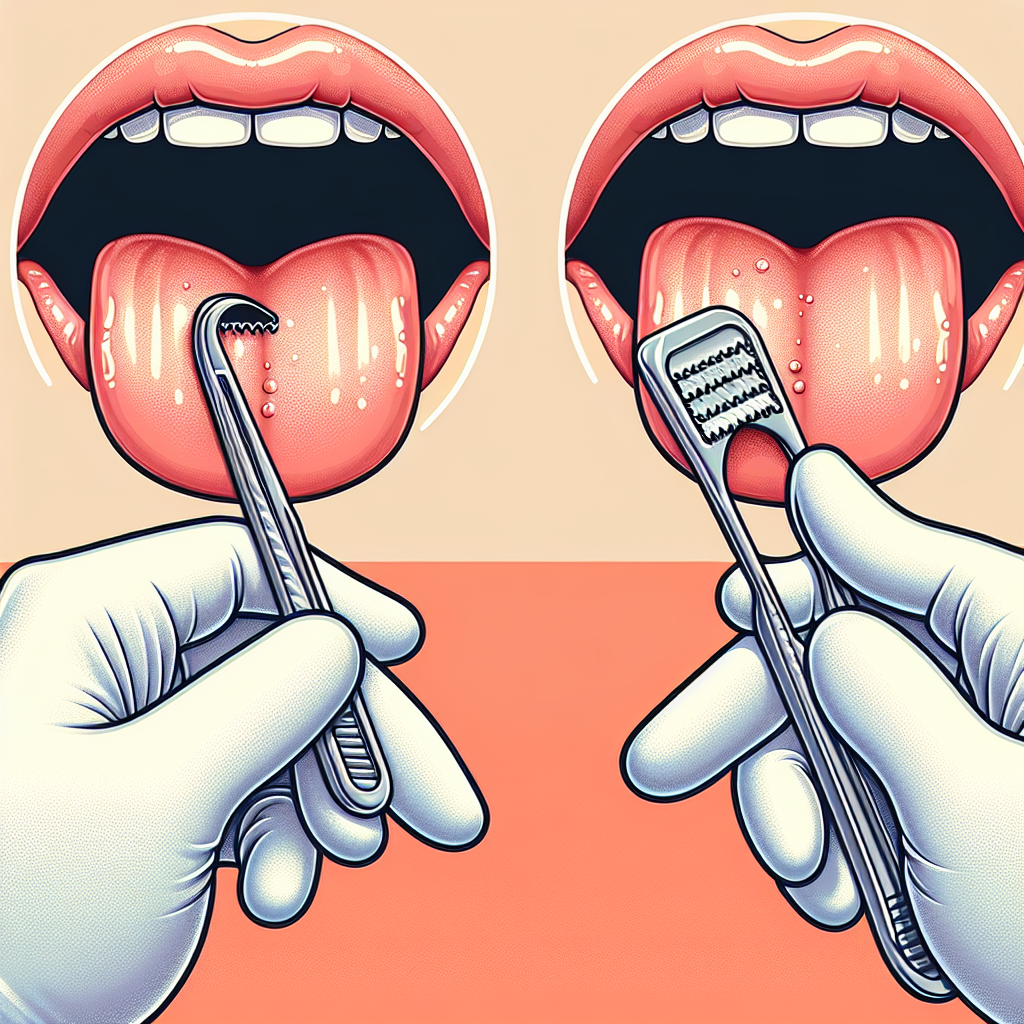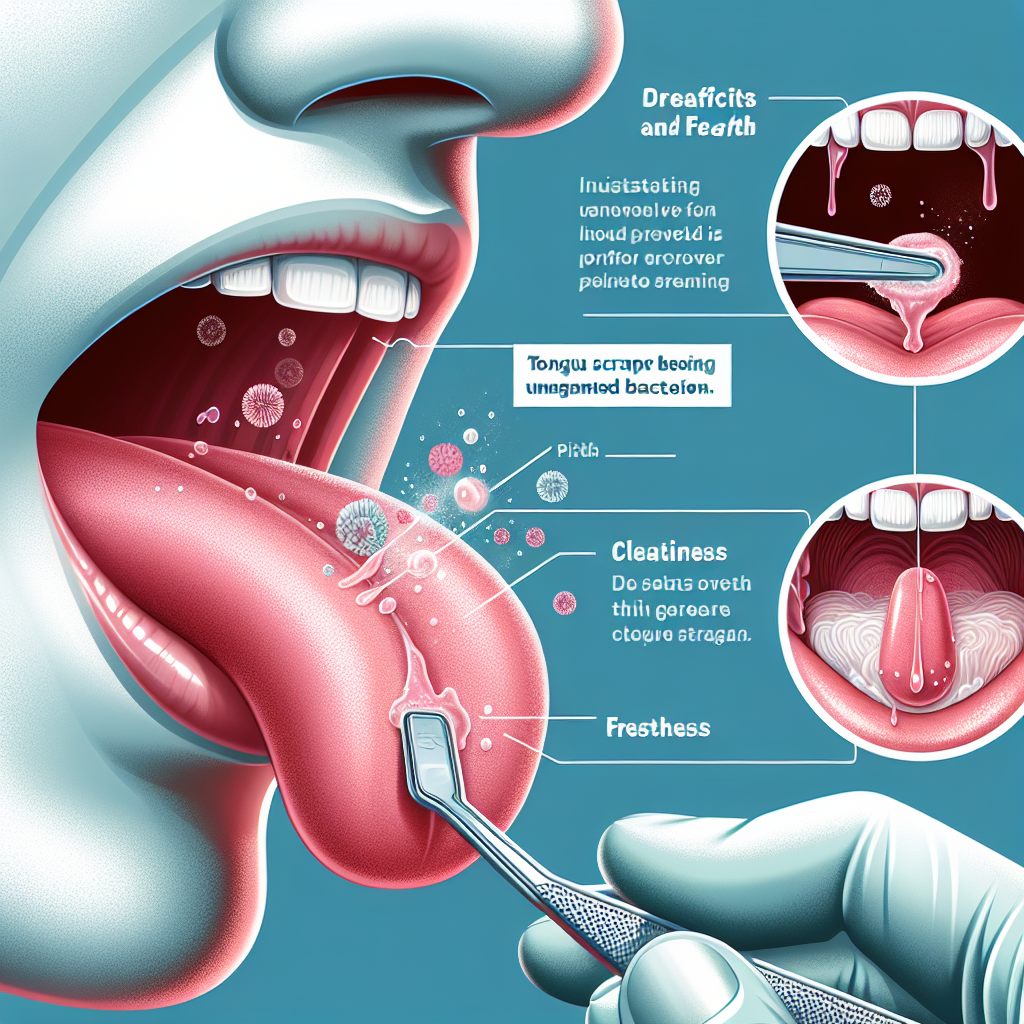What Is Tongue Scraping and Why It Works

Discover the benefits of tongue scraping and why it works! This simple yet effective oral hygiene practice can significantly improve your oral health. Learn more about it and how to properly do it on our website. Click here to start your journey towards better oral health today.
Understanding the Benefits of Tongue Scraping: A Comprehensive Guide
Tongue scraping, an ancient Ayurvedic practice, has recently gained popularity in the Western world due to its numerous oral health benefits. This simple yet effective oral hygiene routine involves the use of a tongue scraper, a U-shaped device made of metal or plastic, to remove bacteria, food debris, fungi, toxins, and dead cells from the surface of the tongue.
The process of tongue scraping is straightforward. It involves gently dragging the scraper from the back of the tongue to the front, rinsing the scraper after each pass. This practice is typically performed in the morning, before brushing the teeth, to eliminate the build-up that has accumulated overnight.
The benefits of tongue scraping are manifold. Firstly, it significantly improves oral hygiene. The mouth is home to hundreds of different types of microorganisms, some of which are harmful and can lead to oral health issues such as cavities, gum disease, and bad breath. By removing the coating of these microorganisms from the tongue, tongue scraping helps to maintain a cleaner mouth and fresher breath.
Secondly, tongue scraping enhances the sense of taste. The build-up on the tongue can dull the taste buds, reducing the ability to distinguish between different tastes. Regular tongue scraping can remove this coating and expose the taste buds, thereby improving the sense of taste. This can lead to better enjoyment of food and may even help to control portion sizes, as food will be more satisfying when it can be tasted fully.
Thirdly, tongue scraping promotes overall health. The mouth is the gateway to the body, and the bacteria in the mouth can enter the bloodstream and affect overall health. By reducing the amount of harmful bacteria in the mouth, tongue scraping can help to prevent potential health issues caused by these bacteria.
Despite these benefits, it’s important to note that tongue scraping is not a substitute for brushing and flossing. It is an additional step that can enhance oral hygiene, but it does not replace the need for regular brushing and flossing.
Moreover, while tongue scraping is generally considered safe, it should be done gently to avoid injuring the tongue. Using a tongue scraper that is too sharp or applying too much pressure can cause discomfort or even lead to cuts and abrasions. It’s also essential to clean the scraper thoroughly after each use to prevent the growth of bacteria on the device.
In conclusion, tongue scraping is a simple and effective practice that can significantly improve oral hygiene, enhance the sense of taste, and promote overall health. By incorporating this practice into their daily routine, individuals can enjoy fresher breath, a cleaner mouth, and potentially even better health. However, it’s important to remember that tongue scraping should be done gently and in conjunction with regular brushing and flossing to maintain optimal oral health.
The Science Behind Tongue Scraping: Why It Works

Tongue scraping, an ancient Ayurvedic practice, has recently gained popularity in the Western world due to its numerous oral health benefits. This simple yet effective oral hygiene routine involves the use of a tongue scraper, a U-shaped device, to remove bacteria, food debris, fungi, toxins, and dead cells from the surface of the tongue. But what is the science behind tongue scraping and why does it work?
The human mouth is a complex ecosystem, home to hundreds of different types of microorganisms. While some of these microorganisms are beneficial, others can cause oral health problems such as bad breath, tooth decay, and gum disease. The tongue, with its numerous crevices and taste buds, provides an ideal environment for these harmful microorganisms to thrive. When we eat, food particles get trapped in these crevices, providing a food source for bacteria. Over time, a layer of bacteria, food debris, and dead cells, known as a biofilm, forms on the surface of the tongue. This biofilm is often the main culprit behind bad breath and can also contribute to other oral health problems.
This is where tongue scraping comes in. The act of scraping the tongue disrupts this biofilm, effectively removing bacteria, food debris, and dead cells from the surface of the tongue. This not only helps to improve oral hygiene but also enhances the sense of taste by exposing the taste buds. Furthermore, by reducing the number of harmful bacteria in the mouth, tongue scraping can help to prevent tooth decay and gum disease.
The effectiveness of tongue scraping is backed by scientific research. A study published in the Journal of Periodontology found that tongue scraping significantly reduced the number of bacteria in the mouth, including the bacteria responsible for bad breath. Another study published in the Journal of Oral Rehabilitation found that tongue scraping was more effective at removing bacteria from the tongue than a toothbrush.
Tongue scraping also has a physiological effect on the body. According to Ayurvedic medicine, the tongue is a map of all the organs in the body. Different areas of the tongue correspond to different organs. By scraping the tongue, you are stimulating and massaging these corresponding organs, promoting overall health.
Moreover, tongue scraping promotes salivation. Saliva plays a crucial role in oral health. It helps to moisten the mouth, making it easier to swallow food. It also helps to neutralize acids, preventing tooth decay and gum disease. By promoting salivation, tongue scraping helps to maintain a healthy oral environment.
In conclusion, the science behind tongue scraping is quite straightforward. By physically removing bacteria, food debris, and dead cells from the surface of the tongue, tongue scraping helps to improve oral hygiene, prevent oral health problems, enhance the sense of taste, stimulate the corresponding organs, and promote salivation. So, if you’re looking to improve your oral health, consider adding tongue scraping to your daily oral hygiene routine. It’s simple, quick, and the benefits are backed by science.
Exploring Tongue Scraping: Its Importance and Effectiveness
Tongue scraping, a practice that dates back to ancient times, has recently gained popularity in the realm of oral hygiene. This simple yet effective practice involves the use of a small, rounded tool to gently scrape off the buildup of bacteria, food particles, and dead cells from the surface of the tongue. Despite its simplicity, tongue scraping has been lauded for its numerous benefits, particularly in promoting oral health and overall well-being.
The human mouth is a breeding ground for various types of bacteria, some of which are beneficial, while others can cause harm if left unchecked. These harmful bacteria can accumulate on the tongue, leading to a range of oral health issues such as bad breath, tooth decay, and gum disease. This is where tongue scraping comes into play. By physically removing the bacterial buildup, tongue scraping helps to maintain a cleaner oral environment, thereby reducing the risk of these problems.
One of the most immediate benefits of tongue scraping is the improvement in breath freshness. Bad breath, or halitosis, is often caused by the metabolic byproducts of bacteria on the tongue. By removing these bacteria, tongue scraping can effectively combat bad breath, providing a simple solution to a common problem that can cause social embarrassment.
Moreover, tongue scraping can enhance the sense of taste. The buildup on the tongue can coat the taste buds, dulling the sense of taste. Regular tongue scraping can remove this coating, allowing the taste buds to fully perceive the flavors of food and drink. This not only improves the enjoyment of meals but may also lead to healthier eating habits, as a heightened sense of taste can reduce the desire for overly sweet or salty foods.
In addition to these tangible benefits, tongue scraping also contributes to overall health. The mouth is the gateway to the body, and a clean mouth can help to prevent harmful bacteria from entering the digestive tract and bloodstream, where they can cause broader health issues. Furthermore, according to Ayurvedic medicine, tongue scraping can stimulate the internal organs through energetic connections and promote general detoxification.
Despite its benefits, it’s important to note that tongue scraping is not a substitute for other oral hygiene practices such as tooth brushing and flossing. Rather, it should be incorporated into a comprehensive oral hygiene routine for optimal results. It’s also crucial to use a proper tongue scraper, which is designed to be gentle on the tongue while effectively removing buildup. Using other objects, such as a toothbrush or spoon, may not be as effective and could potentially cause harm.
In conclusion, tongue scraping is a simple and effective practice that offers numerous benefits for oral health and overall well-being. By regularly removing the bacterial buildup on the tongue, it can help to freshen breath, enhance the sense of taste, and contribute to general health. As part of a comprehensive oral hygiene routine, tongue scraping can be a valuable tool in maintaining a clean and healthy mouth.